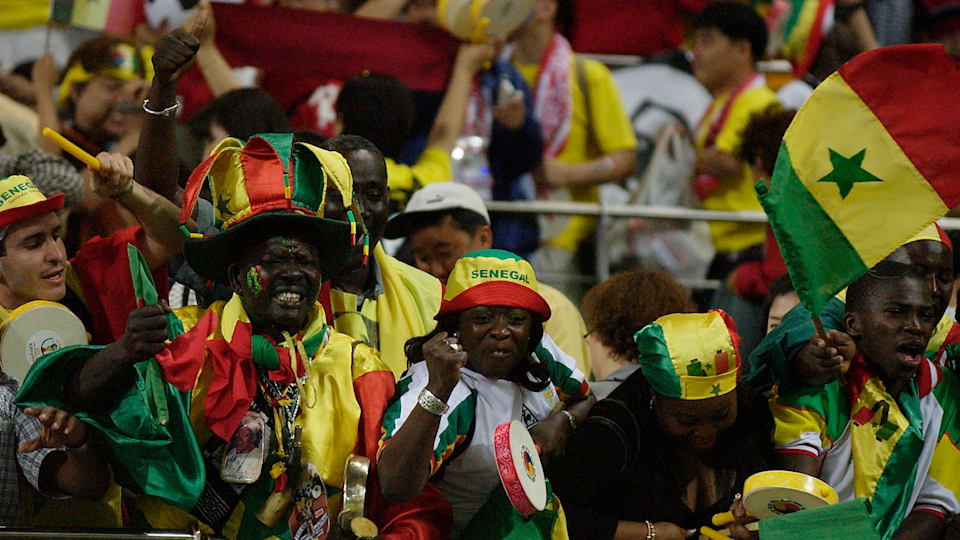Football as a religion in Senegal
The Senegalese are passionate about football and the victory of the national team in the last AFCON tournament only reinforced their love for the sport. Olympics.com looks at the deep link between the Senegalese people and football.

On 7 February 2022, Hundreds of thousands of Senegalese people took to the streets of Dakar to celebrate a historic event.
The day before, the national football men's team had won the Africa Cup of Nations (AFCON) for the first time in their history. Sadio Mane and his teammates were crowned victors after a thrilling 4-2 penalties win over Egypt after a 0-0 stalemate in regulation time.
To celebrate this title, the first in a major international competition for the Lions de la Terranga, 7 February was declared a "paid holiday" by Macky Sall, the country's president. The decision was one example of how important football is in Senegal.
"It was beautiful, it was magical. When we got off the plane, we couldn't get out nor move because of all the Senegalese people outside. They were proud of us, but we were also proud of them. We said to ourselves that this must not end. Senegalese people deserve a trophy in every competition," recalled Cheikhou Kouyate, a Senegalese Nottingham Forest player who was part of the winning team, when looking back on the procession that lasted the eight-hour journey between the airport and the presidential palace.
A few weeks later, the crowd was also present for the country’s final 2022 FIFA World Cup qualifier, but it could have been even bigger, according to National coach Aliou Cisse. After his team once again beat Mo Salah's Egypt, he dedicated the victory and qualification to the Senegalese people.
"If the Diamniadio’s Stadium had a capacity of 16 million, the whole country would have come to the game," the former player said to Le Monde.
The most dedicated supporters arrived at the stadium ten hours before kick-off for the crucial match. But Senegal, the hosts of the Youth Olympic Games Dakar 2026, had become a real cult of football long before that moment.
Three years after independence Senegal host the Friendship Games
In 2019, Mane's teammates were beaten by Algeria (0-1) in the final of the AFCON. Despite this setback, the crowd lined the streets of Dakar to welcome the continental runners-up.
And it wasn’t the first time. Sport, and football in particular, has always been popular in Senegal.
In 1963, three years after the nation gained independence, Senegal hosted the Friendship Games. In this multi-sport competition, the forerunner to the African Games, Senegal won the football tournament. The opening ceremony took place in the Stade de l'Amitié, with 40,000 spectators gathered there, despite a capacity of only 20,000.
The national football team, which was formed only months after independence, began its incredible journey with two continental semi-final runs in the 20th century (1965 and 1990) and the country hosted the AFCON in 1992. At that time, the biggest Senegalese stars were Roger Mendy and Jules Bocandé.
Ten years later, Senegal reached the final of the AFCON for the first time in its history. This progress enabled the country to enter the top 20 of the FIFA rankings at the beginning of 2022 - the first African nation to do so in four years.
They'll be hoping to go even further at the Qatar 2022 World Cup.
Sadio Mane: from Senegal to some of the biggest clubs in the world
Although a traditional form of wrestling is the national sport, football is also extremely popular in Senegal with many children playing the sport in Dakar and other cities.
Even on the Goree Island, which is less than one square kilometre in size, there is a football field where tournaments are hosted. And despite the huge baobab, a holy tree in Senegal, that stands in the field, everyone plays football with true passion there.
“It’s a way of mixing generations. Every Sunday, we see the old ones playing against the young ones. That’s something you don’t see often in other stadiums or in other countries. It is important for the sociological balance of the Island,” said Augustin Senghor, the mayor of Goree in a Canal+ documentary about this very special stadium.
Nothing can dim the love Senegalese people have for football. And this love only grows when they see footballers from Senegal transfer to some of the biggest clubs in the world.
Such is the case with Mane, who played at Olympic Games London 2012 and finished 2nd in the ranking for the Ballon d'Or 2022. The striker starred for Liverpool, winning the English Premier league and UEFA Champions League titles, before joining Bayern Munich in Germany's Bundesliga. He has been voted African football player of the year twice. Before him, only one other Senegalese player had won this prestigious award: El-Hadji Diouf.
The first golden generation of Senegalese football players in 2002
Diouf also played for Liverpool and represents the face of another golden generation of the Lions de la Terranga. In 2002, Senegal participated in the World Cup for the first time and made history.
Papa Bouba Diop scored the goal that saw off reigning world champions France in the opening match (1-0), and the Senegalese went on to reach the quarter-finals, staying undefeated against Denmark (1-1) and Uruguay (3-3) and then eliminating Sweden (2-1) in the round of 16. Their incredible story finally ended in extra time of the quarter-final against Turkey when they lost 1-2.
In the history of the World Cup, only one African nation had made it into the quarter-finals before: Cameroon in 1990.
Senegal’s performance allowed the world to discover the passion the country has for football, so it was little surprise in 2022 when a whole country celebrated its national team’s performance as one. Perhaps Kouyate summed up the special relationship between the national team and its fans.
“The national team belongs to the Senegalese people. To all Senegalese.”
